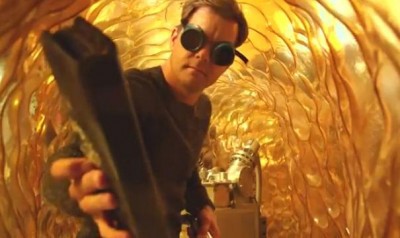How Does "Fringe" End? (Or, *When* Does "Fringe" End?)

“Fringe,” the only prime time SF show to make it through a fairly natural lifespan without becoming a disaster, concludes tonight. I did not want to love “Fringe,” but it happened anyway. From its beginnings as cheerful but fresh Mulder and Scully redux to its rampaging full-on SF freakout middle period to its dark dystopian final season, “Fringe” avoided the varied and terrible pitfalls of often-great shows like “Lost,” “X-Files,” “Dollhouse,” “V,” “Firefly,” “Heroes” and “Battlestar Galactica,” all of which were either tortured by networks or tortured by showrunners. Or both.
(Sure, on the “natural lifespan” thing: I mean, yes, it is slightly awkward that the show concluded at exactly 100 episodes, the happy syndication mark, but let’s ignore that. Five great full seasons! Let’s hear it for that.)
And now, the show has to end: wrapping up a whole lot of business with a double episode. We’ve had a rough time recently with dramatic TV show endings. The final episodes of “Lost” and “Battlestar” caused a good chunk of their loyal viewers to run screaming through the streets with clubs and torches. After that, the whole idea of the ambitious series finale has gotten a bad rap. It’s almost better to safely sidle out. Keep your dignity, your good scorecard, your happy fans. Resolve some emotional character issues, take care of the season’s big obstacle, everyone gets a hug, ROLL CREDITS. It’s not satisfying, maybe. But at least it’s not enraging. That is, I think, something like what we will get tonight.
Or also Walter dies right off. Kidding! Maybe.
Because we’re definitely not getting a “they were all deaaaad!” or an alternate universe, we’ve been promised. And YET, J. J. Abrams coughed up that it would be “highly unexpected.” Hmm.
And in even better news, the finale returns to its roots. Boom, alternate dimension, Olivia skips over to a different timeline, and it’s back to the Statue of Liberty: it’s thematically beautiful, it’s smart, it thanks the viewers, so thank you back and goodbye.
It also gives them a chance to end the series at literally any point in its own time, or any other time.
HMM.
A few good points from here and there today:
• “Part procedural, part X-Files-like Mystery of the Week (especially in the early seasons), Fringe benefited from the engrossing cadence of the former and the addictive catharsis of the latter. Plus, Fringe’s overarching mythology was rich enough to get lost in, yet controlled, limited, and familiar enough (unlike Lost) that it didn’t veer into the frustratingly arbitrary or absurd.”
• “Let us pause to praise John Noble’s textured performance as Walter Bishop — and his talented potrayals of Walter Bishop, Walter Bishop and Walter Bishop. And Anna Torv? Her work as Olivia Dunham, Olivia Dunham and Olivia Dunham has built a one-dimensional character into a genuine, multifaceted sci-fi heroine.”
• “I’ll reiterate as I often have that I don’t consider endings to be of vital importance to a series as a whole. Whether the Fringe finale is weak or strong is, to me, only a reflection of that episode itself. I’ll count myself as a fan of the show regardless. My hope is that the finale will be more “Worlds Apart” then “Brave New World.” But I also recognize that when all is said and done, in this show about alternate realms and infinite possibilities, some hard choices will have to be made — and not just by the heroes.”
I’m not sure I agree that much with that last, though I wish I did. For me, the last taste of a TV show colors my entire relationship with it, like the last pages in a book or the last bites of pie. Although no matter what happens, I’ll still find it impressive that this show lived for five long seasons and didn’t ever collapse in on itself.
